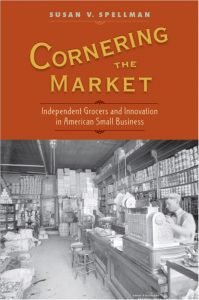 Cornering the Market: Independent Grocers and Innovation in American Small Business, 1860-1940 (Oxford University Press, 2016)
Cornering the Market: Independent Grocers and Innovation in American Small Business, 1860-1940 (Oxford University Press, 2016)
Overview
Historians celebrate grocery supermarkets and chain stores, praising them for their efficiency and up-to-date methods, while scorning small stores for their “backward” ways. My book examines nostalgic stereotypes of antiquated storekeepers to argue that nineteenth- and early twentieth-century grocers were important but unsung innovators of business models and retail technologies that fostered the rise of contemporary retailing. Within the walls of these small shops, proprietors wrestled with fundamental changes in the structures of retailing and commercial capitalism, including the development of mass production, distribution, and marketing, the growth of regional and national markets, and the introduction of new organizational and business methods. Yet today we know very little about the considerable achievements of these small businessmen and their corner stores and even less about their major contributions to the making of “modern” commercial enterprise in the United States.
Reviews
“Spellman successfully overcomes the forces of sentimentality and top-down stories of corporate innovation to recast independent grocers as important agents of modernization. . . . From now on it will be hard to ignore the significance of independent grocers in the history of modern American enterprise.” —Journal of Social History
“Spellman (Miami University) provides readers with a fascinating description of the role of independent grocers in spurring innovation within the retail function in the 19th century. Highly recommended.”–CHOICE
“Like the inviting stores it describes, Susan Spellman’s Cornering the Market captures the imagination. In marvelous detail, she recounts the entrepreneurs who started small grocery shops and the range of companies–Quaker Oats, National Biscuit, American Tobacco, National Cash Register–that tried to sell them products, technology, and ideas. It is a well-crafted story of enterprise, culture, and capitalism.”–Walter A. Friedman, author of Birth of a Salesman: The Transformation of Selling in America and Fortune Tellers: The Story of America’s First Economic Forecasters
“Although often viewed as quaint holdovers from a mythic past, local grocery stores are shown in this book to have been key agents of a modernizing impulse in American capitalism from the Civil War era to the New Deal. Rich and entertaining detail abounds in this fine-grained historical analysis framed by empathy rather than disdain for how small businessmen set the stage for the 20th-century growth of chain stores such as the Great Atlantic and Pacific Tea Company and eventually Walmart.”–Shane Hamilton, The York Management School, University of York
“This book fills in gaps in historical knowledge about the history of grocery stores, and also challenges readers to rethink the key tenets in business history. Dr. Spellman shows how small retailers were at the center of the burgeoning American economy.”–Tracey Deutsch, author of Building a Housewife’s Paradise: Gender, Government, and American Grocery Stores in the Twentieth Century



